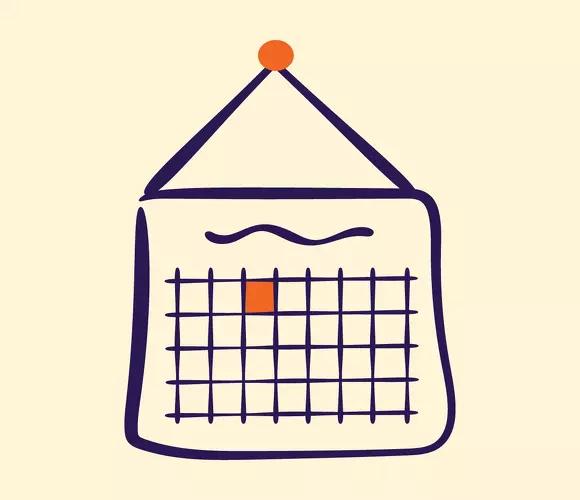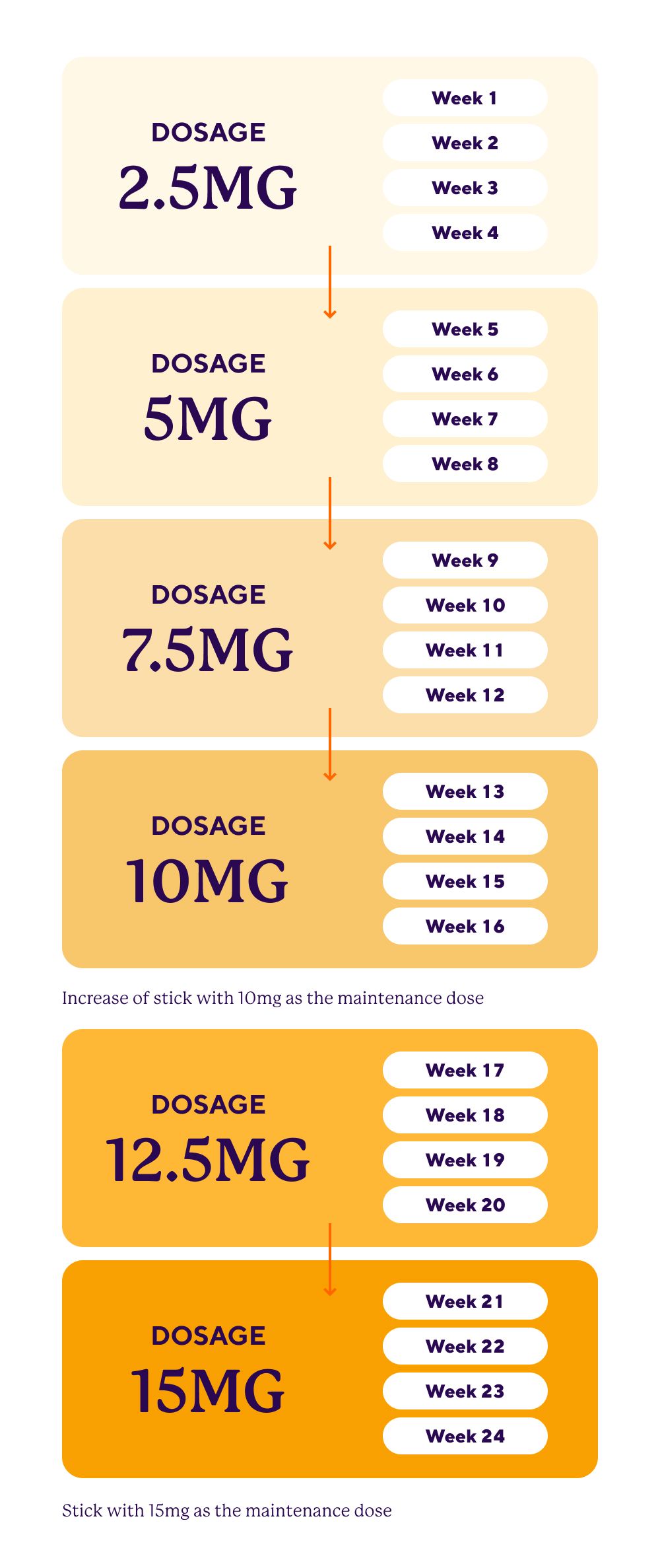It can be tough to lose weight through changes to diet and exercise alone. If you can relate to that—we see you.
For some, a healthy lifestyle can lead to losses of up to 10% body weight (which is a great result!). But when medicines like Mounjaro are used as well, people have reported losing up to 25% of their initial weight.
These medicines work very well, but they aren’t a shortcut to reaching your goals. Nor are they “cheating”. They’re meant to supplement healthy habits and to be taken for at least a year.
If you’re thinking about trying Mounjaro, you might be wondering what results you can expect—and how much weight you might lose. Everyone’s journey is different, so we can’t say for sure. But we can look to scientific research to get a rough idea of what it’s like to use Mounjaro.

Mounjaro results
Here’s a month-by-month snapshot of what to expect when taking Mounjaro, based on clinical trial data from SURMOUNT-1. While trials show a steady progression in dosage and weight loss, everyone’s journey is unique—factors like starting weight, lifestyle, and individual response can all play a role.
Weight loss is a gradual process, and with Mounjaro, it can take up to 18 months to see the full impact. On average, people lose around 4% of their body weight by month one, 6% by month two, 9% by month three, and 11% by month four, with results reaching up to 22,5% at the 72-weeks mark. But Mounjaro isn’t a magic fix—long-term success depends on making sustainable changes to your daily habits.
- Month 1: Mounjaro 2.5mg - Expected weight loss under 4% body weight
- Month 2: Mounjaro 5mg - Expected weight loss 5% - 6% body weight
- Month 3: Mounjaro 7.5mg - Expected weight loss 8% - 9% body weight
- Month 4: Mounjaro 10mg - Expected weight loss 11%-12% body weight
- Month 5: Mounjaro 12.5mg - Expected weight loss 12% - 13% body weight
- From month 6 onwards: Mounjaro 15mg - Expected weight loss 14% - 22,5% body weight
Mounjaro week 1-2: Starting your Mounjaro journey
Here we are: at the very start of your journey with Mounjaro, a weekly injection to help with weight loss. You might be feeling nervous, excited, apprehensive, or a combination of all three. We’re right here with you, and we know you’ve got this.
Your first few weeks are about forming habits and getting used to the medicine rather than seeing results right away. For instance, choosing a day for your injection that you can stick to (there’s no “best” day of the week—so pick the one that’s easiest to remember).
Some people might notice changes already, like feeling more in control of their appetite. But if that’s not you, don’t worry—it doesn’t mean that the medicine isn’t working. Try to be patient: weight loss is a long game, and it’s still early days.
Everyone starting Mounjaro takes the lowest dose, 2.5mg, for four weeks. This helps to minimise the risk of side effects early on, making your journey smoother in the long run.
It’s possible you’ll have some side effects, but these tend to be mild and usually resolve as you progress on treatment. However, if you find the symptoms are difficult to manage at any point, you can always speak to your clinician for further support.
Mounjaro week 3-4: Forming habits
By now, you’ll hopefully be settling into a more consistent routine with Mounjaro. You might also start to see some results. According to clinical trials, on average people lose just under 4% weight after one month.
Though it’s totally fine if you aren’t seeing much improvement yet. Remember, the point of starting on the lowest dose is to get your body used to the medicine.
At around four weeks, Mounjaro will start to reach a steady state—which means that a consistent amount of it stays in your system. So, if you have been noticing any changes, like feeling fuller, these might last longer than in the previous weeks.
Mounjaro week 5-6: Your weight loss journey is underway
You’ve made it through your first month! A big well done from us—we knew you could do it.
It’s time to increase your dose to 5mg. From here, your dose will be dialled up every four weeks unless you get any difficult side effects. Generally, side effects are more likely with stronger doses, but to reiterate, these are mild for most people and tend to clear up. Check with your clinician if they stick around or are bothering you.
Most people will start to see changes around now. At week six, the average loss is around 5%.
This also feels like a good time to remind you to keep up your new, healthy habits. Mounjaro is meant to be used alongside lifestyle changes, so if you take it on its own it might not work as well. Getting used to eating well and exercising more can also help prevent weight regain in the long run.
Mounjaro week 7-8: Building momentum
As you come up to two months on Mounjaro, you should be seeing some visible changes. Maybe your clothes are sitting a little looser, or you feel lighter. The habits you formed back in week one might be starting to feel normal.
Just take a minute to appreciate how far you’ve come. There may still be a way to go, but you’re moving closer to your goals with each passing day.
Mounjaro week 9-12: Staying consistent
If you’ve been tolerating Mounjaro okay so far, your prescriber might suggest upping your dose to 7.5mg.
Research suggests that habits are more likely to stick if you keep them up for at least three months—which is around 12 weeks. So, stay consistent: move your body regularly, eat a nutritionally-balanced diet, and take Mounjaro on the same day each week. Soon, your new routine will feel like second nature.
Clinical research tells us that by week 12, most people on Mounjaro will have lost about 8% of their starting weight.
Mounjaro week 13 and beyond: Maintaining your long-term weight loss
Making it through your first three months is huge! You’re getting closer to your goals and we couldn’t be happier for you.
Your dose might now be increased to 10mg, depending on your progress and how you’re feeling. From here, it could go up twice more: to 12.5mg and finally 15mg.
The next phase of your journey is about making gradual, sustained progress. Mounjaro is most effective when taken for at least a year, so lean in to the routine you’ve established over the past few months: treat it as your new normal.
Mounjaro dosage: Week by week
We’ve already spoken a bit about how dosing works on Mounjaro, but just to spell it out: here’s what a typical schedule might look like.

You’ll only go up to higher doses if your prescriber says it’s okay. Usually though, you’ll be able to progress if you aren’t getting troublesome side effects.
While side effects can happen. They are usually mild and can be dealt with. For example, sipping ginger tea and drinking plenty of water could help with nausea. Eating more fibre might ease constipation. Check in with your doctor if your side effects are becoming a problem or don’t go away though.
FYI: it’s completely fine to stay on a lower dose of Mounjaro—it will still work and may help manage any potential side effects more effectively.
How much weight can you lose weekly on Mounjaro?
This is a tough one, because everyone’s weight loss journey is unique. It’s impossible to say for sure how much weight you’ll personally lose for every week you use Mounjaro.
For instance, your lifestyle (and how well you keep up with your routine) and starting weight can both influence your results.
Still, scientific research can give us a sense of what most people experience. A research programme called SURMOUNT ran three clinical trials looking at how well Mounjaro works for weight loss in people without type 2 diabetes.
They each showed similar results. For one, people tended to lose weight faster when they started taking Mounjaro. After roughly six months, the rate of loss starts to slow (this happens earlier if you stay on a 5mg dose). And then results generally level out at 72-76 weeks.
How much you lose also depends on the strength of Mounjaro you’re taking: higher doses usually lead to a greater loss. According to clinical trial data reported by the manufacturer, the mean loss after 72 weeks for people who stayed on 5mg was 16%, while for those on 10mg it was 21.4%. People taking 15mg lost 22.5%.
Roughly speaking, here’s the average loss these trials reported by week. Head’s up: these ranges include people taking different doses of Mounjaro. So, if 15mg was your regular dose, you’d be more likely to come in at the higher end.
Mounjaro weight loss: Week-by-week tips
We know we’ve said this a lot, but it really is so important: the healthy habits you forge are absolutely key to losing weight and keeping it off.
That’s why our weight loss programme includes access to personalised, expert guidance on how to make changes and stick with them.
But for now, here’s some tips to help set you up for success:
Eat well
It sounds obvious, but your diet is crucial in helping you lose weight. There’s no consensus on what the “best” option here is, nor is there a specific diet that’s recommended for Mounjaro. But the general advice is to reduce calorie intake and eat a nutritionally-balanced diet. That means plenty of whole grains (like brown rice) and at least five servings per day of fruit and vegetables, with only a little bit of foods high in fat or sugar.
Keep tabs on yourself
Monitoring your habits, like noting down your meals in a food diary, can help you to develop a sense of accountability—which can help you change your behaviour. In our weight loss programme, you can track your progress via our app.
Become aware of your appetite
Hunger is a physical sensation that comes from the stomach, whereas a craving is our brain telling us we want something. Learning how to recognise signs of hunger versus a craving can help some people to be more mindful in their eating habits.
Move your body
Simply put: when you’re active, your body uses more energy. In the scientific research we’ve been talking about, people met the minimum recommended amount of weekly exercise: 150 minutes of moderate-intensity movement. This could be brisk walking, cycling, hiking, or dancing around in your kitchen.
Get a good night’s rest
Not getting enough shut-eye affects our appetite and can cause us to eat more. And the foods people tend to reach for are high-calorie options, like fast food.
Your next step
We hope that you’ve now got a better sense of what to expect on Mounjaro. And if you are wanting to give it a try, we are here to support you one hundred percent of the way.
When it comes to losing weight, there’s no substitute for personalised, expert advice—and you can get one-to-one support from our coaches through our weight loss programme. You’ll also get weekly medication and access to an app to monitor your progress. You can get started right away by filling out this short form.










